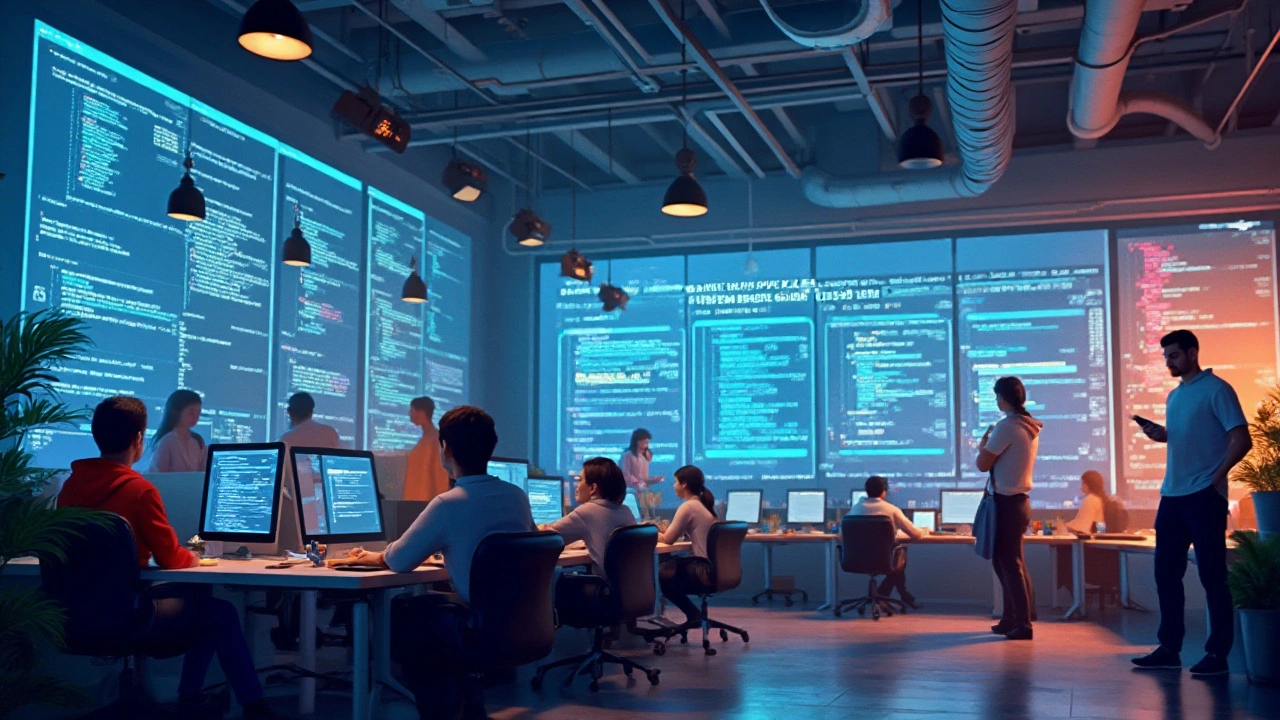Mastering PHP Development: Essential Hacks for Modern Coders

PHP may have been around for decades, yet it continually adapts to the changing landscape of web development. Once critiqued for its simplicity, PHP today stands robust and versatile, empowering developers with the tools needed for dynamic websites and applications. As we move through 2025, mastering PHP isn't just helpful; it remains crucial.
For those looking to refine their skills or re-discover PHP, this guide offers a look into modern tricks and techniques that can make your coding not just effective but efficient. From innovative methods to avoid common pitfalls, you'll find practical advice that translates into real-world applications. Let's embark on this journey to see how PHP continues to remain relevant and how you can take your coding game to the next level.
- Why PHP Still Matters
- Latest PHP Techniques
- Common Mistakes and How to Avoid Them
- PHP Development for Future Trends
Why PHP Still Matters
PHP has long been a staple of web development due to its exceptional ability to create dynamic and interactive web pages. As of 2025, around 79% of websites that use server-side programming languages rely on PHP. Despite the burgeoning popularity of newer languages, PHP's resilience and adaptability make it an indispensable tool for modern developers. Often considered the 'old guard' within the tech stack, its longevity is a testament to its reliability and capability to meet evolving demands. Its expansive ecosystem, including frameworks and libraries like Laravel and Symfony, offers robust solutions for building secure, fast, and scalable applications. Not only is PHP simple to learn for novices, but it also provides advanced capabilities for experienced developers, ensuring a solid foundation across varying levels of expertise.
What many may find surprising is how PHP constantly evolves to keep pace with technological advancements. The introduction of PHP 8 brought groundbreaking features like Just-In-Time (JIT) compilation, which made performance markedly better. This advancement is crucial as websites and applications demand faster load times and better processing capabilities. Additionally, PHP's compatibility with HTML and databases like MySQL enables developers to create complex websites with relative ease. It is highly valuable in creating CMS platforms, including giants like WordPress, which powers about 43% of the web, showcasing PHP's underlying architecture's influence and utility. Moreover, PHP's open-source nature makes it a community-driven language, continually enriched by developers worldwide, bringing in cutting-edge enhancements and robust security features.
In terms of cost, PHP offers a cost-effective solution for both startups and established enterprises. Being open-source, it not only eliminates licensing fees but also boasts a large repository of free tools and extensions, further reducing development costs. As developers frequently contribute their work back to the community, businesses can leverage pre-built modules and plugins, saving both time and resources. Additionally, the ample documentation available means the learning curve is manageable, allowing businesses to onboard developers quickly.
Rasmus Lerdorf, the creator of PHP, once remarked, "I actually hate programming but love solving problems." Even today, this sentiment resonates with developers who opt for PHP. It's not just about programming; it's the efficiency in problem-solving that PHP facilitates. With versatile applications ranging from simple websites to comprehensive enterprise systems, PHP continually proves its relevance. Its capability to integrate seamlessly with various technologies and platforms underscores its adaptability in a rapidly changing digital world.PHP's importance today is also underscored by its integral role in cloud computing and scalable web services. As companies move towards serverless technologies and microservices architecture, PHP's adaptability ensures that it remains part of this transformation. The language supports RESTful APIs, allowing seamless data exchange over the internet, essential for building interconnected systems and mobile applications. As businesses continue to migrate older systems to the cloud, PHP's flexibility and reliability will remain instrumental in these digital transformations.

Latest PHP Techniques
The rapid evolution of technology demands that developers keep their skills sharp and stay updated with the latest advancements. As we navigate 2025, PHP continues to offer innovative solutions that cater to modern development needs. One of the standout features is the introduction of just-in-time (JIT) compilation in PHP 8, which significantly improves performance. This enhancement minimizes the time scripts take by converting PHP into intermediate code, making execution faster, which is a boon for modern developers eyeing resource-intensive applications. Whether building complex systems or simple applications, JIT alteration redefines the traditional execution metric of PHP, offering a near-native execution speed.
Another modern PHP trick making waves is the usage of typed properties, allowing developers to define the type of property within a class directly. This feature not only leads to cleaner code but also minimizes bug occurrences, promoting robust application development. PHP 8 introduced union types, a sought-after feature for developers working on APIs or cases where parameters can hold multiple types. This flexibility keeps the code agile and adaptive, ready to meet the varied demands of different functionalities.
The power of attributes in PHP 8 can't be overstated; they bring annotations to life, allowing metadata to be structured seamlessly. Attributes provide a declarative way to streamline tasks like ORM mappings or defining routes, making codebase maintenance significantly simpler. This feature reduces dependencies on external parsing tools, making PHP a self-sufficient powerhouse.
Structured metadata usage is another area transformed by attributes, bringing improvements in how functions like reflection are managed. Using attributes, developers delineate classifications straight into the code, offering clarity and centralized controls. With PHP evolving continuously, it's crucial to keep abreast of these features, ensuring that your practices remain both current and efficient.
As Rasmus Lerdorf, the creator of PHP, once noted, 'I really don’t like programming. I built this tool to program less so that I could just reuse code.' The latest PHP techniques echo this sentiment, focusing on reusability and efficiency.
Also imperative in modern PHP development is the concept of nullsafe operators, introduced to enhance conditional checks. As an alternative to lengthy if-statements, the nullsafe operator streamlines code by automatically returning null if any intermediary expression returns null. This technique enlightens developers by reducing verbose code, enhancing readability and comprehension tremendously.

Common Mistakes and How to Avoid Them
Beginning with PHP can feel like a walk in the park, but as you stroll along, it’s easy to stumble into some pitfalls that many developers encounter. Often, the simplicity of PHP can be its own worst enemy. While its flexibility is one of its biggest strengths, it's also the reason why new, as well as experienced developers, may fall into common traps. One of the most persistent mistakes is neglecting proper input validation and sanitization, which can lead to vulnerabilities like SQL injections. This is something that experienced programmers quickly learn to avoid, but it's a mistake often revisited, especially by those just getting started. Be it from the fear of adding complexity or simple oversight, skipping proper data handling can lead to severe consequences.
An overlooked feature of PHP is its error reporting. Many developers turn off error reporting in production environments with error_reporting(0) to avoid causing alarm to users, but they forget to re-enable it during development. This leads to missed warnings and errors, which can make debugging very challenging. Unlike many languages, PHP error handling isn't omnipresent; it has to be activated intentionally, ensuring developers can monitor their scripts closely. Developers should be encouraged to log errors to a file instead of the user screen, using error logging settings such as ini_set('log_errors', true) and ini_set('error_log', 'path/to/your/logfile'), to balance user experience with effective debugging strategies.
Mistake: Misusing Variables
Variable mismanagement is another frequent stumbling block. PHP is a loosely typed language, meaning it doesn't require explicit declaration of data types. While this feature makes rapid development more accessible, it can result in unexpected behavior if not treated carefully. For instance, when working with strings and integers, PHP will perform type juggling to assume the expected type, which can lead to unexpected results in mathematical operations. Developers should make judicious use of PHP's data type functions and enforce strict mode using strict_types where possible to ensure that their code runs predictably.
Developers also often mishandle variable scope or improperly use global variables. PHP's default to global variables can cause unintended overwriting, leading to bugs that are hard to trace back. Using superglobals, overly relying on the same, or incorrectly managing sessions are symptoms of this issue. By employing practices such as encapsulation and utilizing namespaces, you can keep variable scope under control. Encouraging the use of functions and classes can help modularize code and reduce unintended variable clashes, keeping your scripts clean and organized.
Mistake: Ignoring Security Best Practices
Security remains a critical concern especially with PHP's wide utilization in web development. A common mishap is leaving the door open to security threats by ignoring crucial PHP configuration settings. Default configurations might seem harmless initially, but they can expose applications to attacks. Ensuring critical settings like allow_url_fopen and register_globals are set to 'Off' helps mitigate risk. Another source of trouble is outdated libraries and components. Many developers assume the libraries bundled with PHP installations are safe, yet these may carry known vulnerabilities if not kept current. Regular updates and security patches are essential in maintaining your application’s defenses. According to a report by OWASP, failing to update dependencies is a key reason why applications encounter runtime issues, and keeping everything updated forms a solid primary defense layer. Engaging in good habits such as utilizing PHP's built-in functions instead of writing custom ones, where applicable, can dramatically reduce exposure to many common vulnerabilities.

PHP Development for Future Trends
The landscape of PHP development is on the cusp of significant evolution, driven by technological advancements and the ever-growing demands of the digital world. While AI and machine learning permeate almost every facet of technology, PHP is no exception. Developers can leverage PHP to integrate AI-driven features into their applications, enhancing user experiences with personalized content and intelligent automation. PHP frameworks such as Laravel are increasingly incorporating AI capabilities, providing a seamless way to harness these technologies.
Moreover, PHP's role in IoT (Internet of Things) is expanding, with its lightweight and efficient nature making it a viable option for IoT project backends. As IoT devices proliferate, PHP's utility in managing and processing vast arrays of sensory data is expected to grow. This shift necessitates a honing of skills specific to data parsing and analysis, areas where PHP's versatility shines.
"PHP continues to prove its worth in web development, adapting to new technologies and trends, thereby maintaining its relevance," says a leading tech analyst from CodeFuture Magazine.
Another key trend is the rising importance of cybersecurity within the realm of PHP development. With cyber threats evolving, developers are urged to prioritize security from the onset of development. Utilizing built-in security features and staying ahead with industry best practices are critical. This focus on security isn't just a trend but a necessity, given the increasing sophistication of cyber threats.
| Year | PHP Version Releases |
|---|---|
| 2023 | PHP 8.3 |
| 2025 | PHP 8.4 Expected |
The future of PHP development is also seeing the integration of cloud-native architectures. Modern developers are progressively adopting these technologies to improve scalability and performance. Techniques such as containerization and microservices are becoming commonplace, enabling developers to build more resilient and scalable applications. The adoption of cloud-based services like AWS, Azure, and Google Cloud further enhances these capabilities, making PHP applications adaptable and ready for future scale.
Ultimately, embracing these future trends in PHP isn't just about keeping up with technology; it's about leveraging these advancements to create solutions that can transform industries. Whether it's AI integration, IoT backend support, or enhanced security features, the future holds myriad opportunities for PHP developers willing to innovate and push boundaries. This adaptability ensures that PHP continues to be an invaluable tool in the ever-changing world of technology.